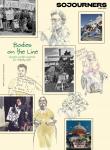ACTS OF ANTISEMITISM in the U.S. are skyrocketing. In October 2021, the American Jewish Committee released data from the largest-ever survey of Jews in the U.S. showing that during the previous 12 months, 1 in 4 Jews experienced antisemitism and 39 percent altered their behavior—such as avoiding wearing items that would identify them as Jewish—out of fear of antisemitism.
In less than four years, the U.S. has seen at least three violent antisemitic attacks on Jewish houses of worship. Eleven people were killed in 2018 at the Tree of Life synagogue in Pittsburgh as a gunman screamed antisemitic slurs. Six months later, a man “inspired” by the massacre at the Tree of Life synagogue attacked a synagogue near San Diego. This January, an armed man spouting antisemitic conspiracy theories took hostages during the Shabbat service at Congregation Beth Israel near Dallas.
While many Christians take note of this disturbing trend with dismay, most haven’t learned how Christianity has been weaponized against Jewish people. For centuries, Jews suffered forced conversions to Christianity in the wake of imperial powers that sought to create “Christian governments” and “Christian nations.” Blood libel conspiracies often led to pogroms against Jewish communities. Christians in Nazi Germany used these conspiracies to gain support for state-sponsored extermination of European Jews. Similar conspiracies against Jews were parroted by white nationalists at the 2017 Unite the Right rally in Charlottesville, Va.
In my own Christian ministry, I hear Christians speak with bewilderment that Jewish folks only accept “half of scripture,” implying that Hebrew scriptures are incomplete. Some Jewish and Christian scriptures overlap, and Christianity has deep roots in Judaism, but Judaism is not “Christianity Lite.” A whole and robust faith, it is one of the world’s oldest monotheistic religions, dating back nearly 4,000 years.
I have also noticed that Christians are unaware of the casual, routine antisemitism in their religious language. I’ve heard sermons in which Judaism was described inaccurately or slanderously. In one example, a preacher referred to Jewish characters in the Bible as “Orthodox Jews” (a movement in Judaism that emerged in the 19th century) who only marked the Jewish holy days because they wanted an excuse to get drunk.
Similarly, I’ve heard the religious practices of biblical figures villainized. For example, Christians often label someone a “pharisee” as a way of calling out insincere piety or self-righteousness. For many Jews, however, the Pharisees are the founders of rabbinic Judaism and hence their own spiritual forebears. Why do Christians perpetuate a negative, legalistic stereotype of Jewish religious life and ignore the positive role some Pharisees have in Christian scripture? Examples include Nicodemus (John 3:1-21), Gamaliel (Acts 5:33-39), and the apostle Paul, considered to be among the most influential people after Jesus in the history of Christianity.
In a 2019 gathering to strengthen Catholic-Jewish relations, Pope Francis specifically noted that negative images of Pharisees, “often without a concrete basis in the gospel accounts,” have been applied to Jews in general by Christians with dangerous results. “One of the most ancient and most damaging stereotypes is that of a ‘Pharisee,’ especially when used to cast Jews in a negative light,” said Pope Francis.
Jewish and Christian communities have a history of coming together in the name of justice. Love of neighbor is a religious value embedded in Jewish teaching and raised up by Jesus as a primary teaching for Christians. But to love our Jewish neighbors better, we need to know them better. To know them better, we must address our prejudices and take responsibility for their deadly consequences.

Got something to say about what you're reading? We value your feedback!

